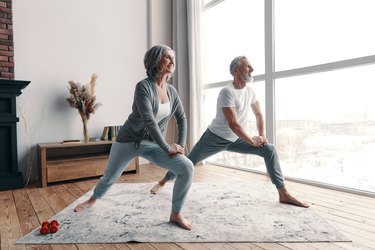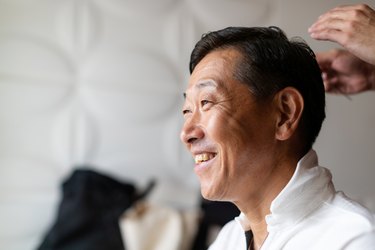
When you were young, wearing a light jacket in the dead of winter kept you warm and cozy. But now, you're finding yourself turning up the heat in your home and layering with extra sweaters to stay warm.
What gives?
Video of the Day
Video of the Day
Don't worry — you're not imagining things. Your body temperature trends cooler as you age.
Increased sensitivity to the cold is often just another normal part of the aging process. But sometimes it can signal a more serious health problem.
Here, Alayne Markland, DO, an associate professor of medicine in the division of gerontology, geriatrics and palliative care at the University of Alabama at Birmingham, explains why you may feel more frigid with age, and provides tips to help you hold onto your body heat.
1. Your Circulation Decreases
With age, your blood vessels become less flexible and can't function optimally.
"They can't constrict or circulate blood like they used to," Dr. Markland says.
When your vessels can't pump blood properly, your body will find it harder to hold onto heat, according to Providence Healthcare. Cold hands and feet, in particular, can indicate a circulation problem is to blame.
2. Your Skin Is Thinner
When you think of aging and your skin, most likely wrinkles come to mind. But there are other age-related changes in your skin that alter your body's temperature control.
As we age, our innermost layer of skin — known as the subcutaneous layer — thins out, according to the U.S. National Library of Medicine (NLM). This layer has fat, so when it thins, we lose insulation and padding, making it tougher to conserve body heat.
In other words, fat is like a protective blanket that keeps us warm, and, with a thinner blanket to shield us from the cold, we're more likely to feel chilly, Dr. Markland says.
3. Your Metabolic Rate Decreases
You've probably heard that metabolism slows with age.
Indeed, by age 50, your basal metabolic rate — the number of calories your body burns at rest — will decrease by 30 percent, per Piedmont Healthcare.
While we usually associate a slowed metabolism with age-related weight gain, it can also affect how your body regulates temperature.
That's because your metabolism is responsible for many chemical processes that keep your body functioning, including converting food into energy to support things like breathing, circulation, digestion and many more life-sustaining tasks, according to Harvard Health Publishing.
When your metabolic rate declines, these processes will also be affected, resulting in an increased sensitivity to the cold.
Take circulation, for example. As your metabolism slows, your blood vessels may be slower to constrict to conserve body heat in chilly temperatures, per Providence Healthcare.
4. You Have an Underlying Medical Condition
Some health problems are more common in older adults and may be the reason why you need to bundle up with a few extra blankets.
For example, certain disorders — like heart disease, kidney disease and anemia — can impede blood flow and reduce body temperature, according to Providence Healthcare.
In addition, thyroid conditions like hypothyroidism affect your metabolic rate and your ability to regulate your body's temperature, Dr. Markland says.
Other diseases like diabetes can damage your nerves and result in neuropathy, (i.e., feelings of cold, numbness or a tingly sensation typically in the hands and feet), per Providence Healthcare.
Neuropathy can even make older adults more susceptible to hypothermia, an abnormally low body temperature that can be potentially life-threatening, Dr. Markland says.
The Risk of Hypothermia for Older Adults
Older adults, especially those with an underlying medical issue or who take medications that increase cold sensitivity (more on this later), are at a higher risk for hypothermia, according to Johns Hopkins Medicine.
A body temperature of 95 degrees Fahrenheit or lower can lead to serious health issues such as heart attack, kidney problems, liver damage or even death, per the National Institute on Aging (NIA).
Hypothermia also affects the brain, including cognition and motor abilities. Classic signs of the condition include, per Johns Hopkins Medicine:
- Confusion
- Sleepiness
- Fumbling hands
- Shivering and exhaustion
- Slow, slurred speech or shallow breathing
- Weak pulse and/or low blood pressure
- Drowsiness
- A change in behavior or appearance during cold weather
- Stiffness in the arms and legs
- Poor control over body movements or slow reactions
If you’re experiencing any of the above symptoms, seek medical attention immediately, as hypothermia can be potentially fatal. Nearly 50 percent of older adults who develop hypothermia die before they can be properly treated, according to Johns Hopkins Medicine.
5. It’s a Side Effect of Your Medication
As we grow older, we're more likely to deal with certain health conditions that require medication. And sometimes, these drugs are the reason for the chill in your bones.
Beta blockers and calcium channel blockers, which are used to treat high blood pressure, are common culprits that can cause cold extremities, Dr. Markland says.
That's because these types of medicines can decrease blood flow to your hands and feet, according to Providence Healthcare.
Tips for Keeping Warm
While you may not be able to control your aging body's ability to conserve heat, you can try these strategies to stay warm, per the NIA:
- Set your heat to at least 68 to 70 degrees Fahrenheit.
- Weatherproof your windows to make sure your house isn't losing heat.
- Dress warmly on cold days even if you're staying indoors.
- Bundle up when you go to bed (wear long underwear under your pajamas and use extra covers).
- Maintain a healthy weight to make sure you have enough fat to insulate your body and keep you warm.
- Limit alcohol, which can make you lose body heat.
- If it's wet outside, wear a waterproof coat or jacket and change your clothes right away if they get damp or wet.
When to See a Doctor
While increased sensitivity to cold is a common part of the aging process, consider visiting your doctor if your symptoms come on suddenly or get worse, you feel freezing when others are comfortable or your cold sensitivity impairs your quality of life, according to Providence Healthcare.
Is this an emergency? If you are experiencing serious medical symptoms, please see the National Library of Medicine’s list of signs you need emergency medical attention or call 911.


